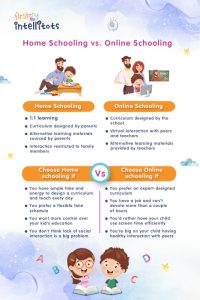Navigating Virtual Learning in Home Schooling

Navigating Virtual Learning in Home Schooling
The landscape of education has undergone a significant transformation with the advent of virtual learning. For home schooling families, this shift presents both opportunities and challenges, requiring a thoughtful approach to ensure a successful and enriching educational experience.
Embracing the Virtual Classroom
With advancements in technology, the virtual classroom has become a central component of home schooling. Online platforms offer a diverse range of courses, allowing students to access quality education from the comfort of their homes. Embracing this virtual setting opens up new possibilities for customized learning experiences.
Tailoring Education to Individual Needs
One of the key advantages of home schooling with virtual learning is the ability to tailor education to individual needs. Whether a student requires additional support in a specific subject or is ready for advanced coursework, virtual learning platforms provide flexibility in adapting the curriculum to meet these unique requirements.
Overcoming Technological Hurdles
While virtual learning brings flexibility, it also comes with its set of challenges, particularly in overcoming technological hurdles. Home schooling parents need to ensure a reliable internet connection and familiarity with online tools. Overcoming these obstacles is essential for a smooth virtual learning experience.
Fostering Social Interaction in a Digital Space
One concern often raised about virtual learning in home schooling is the potential for a lack of social interaction. However, with the right approach, virtual classrooms can become vibrant communities. Engaging in virtual group activities, collaborative projects, and online forums helps foster social connections among home-schooled students.
Building Time Management Skills
Virtual learning requires students to manage their time effectively, a skill that extends beyond academics. Home schooling parents can use this opportunity to guide their children in developing strong time management habits. Establishing a schedule that balances learning, breaks, and extracurricular activities is crucial for academic success.
Utilizing Multimedia Resources for Enriched Learning
Virtual learning opens the door to a wealth of multimedia resources that can enhance the educational experience. Home schooling parents can leverage educational videos, interactive simulations, and virtual field trips to provide a dynamic and enriching curriculum. These resources add a layer of engagement to traditional subjects.
Adapting to Individual Learning Styles
Every student has a unique learning style, and virtual learning platforms can be adapted to accommodate these individual preferences. Home schooling allows parents to identify and cater to their child’s preferred mode of learning, whether it’s visual, auditory, or kinesthetic. This personalized approach fosters a deeper understanding of concepts.
Staying Connected with Educators
Effective communication between home schooling parents and educators is paramount in a virtual learning environment. Regular check-ins, virtual parent-teacher conferences, and clear lines of communication ensure that everyone is on the same page. This collaborative approach contributes to the overall success of the home-schooled student.
Addressing Screen Time Concerns
With the increase in virtual learning, concerns about screen time have become more prevalent. Home schooling parents must strike a balance between online and offline activities. Incorporating breaks, physical activities, and hands-on projects helps mitigate the potential negative






